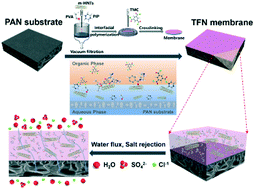Polyvinyl alcohol-assisted high-flux thin film nanocomposite membranes incorporated with halloysite nanotubes for nanofiltration
Abstract
Nanofiltration membranes with superior separation performance are highly desired for water treatment such as desalination. To fulfil the demand for higher permeability and selectivity for thin-film composite (TFC) membranes prepared via interfacial polymerization, nanoparticles were incorporated into the polyamide layer to construct thin-film nanocomposite (TFN) membranes. However, due to the inevitable aggregation of the nanoparticles and the weak adhesion between the nanoparticles and the polymer matrix, the separation performance of the TFN membranes are still not good enough to substitute the commercial NF membrane for desalination. Herein, a PVA-assisted halloysite nanotube (HNT) TFN membrane with high separation performance was fabricated. The HNTs were modified by poly(styrene sulfonate) to obtain m-HNTs with enhanced hydrophilicity and excellent dispersibility. To avoid the loss of nanoparticles during the interfacial polymerization process, a vacuum filtration process is combined with the membrane preparation procedure. The optimal TFN-0.05 membranes showed a superior water permeability of 34.5 L m−2 h−1 bar−1 and Na2SO4 rejection of 97.8% at 4 bar, which is almost twice that of the pristine TFC membrane and superior to the performance of the traditional desalination membranes. This facile strategy may provide a useful guideline for the construction of highly permeable TFN membranes for desalination.



 Please wait while we load your content...
Please wait while we load your content...